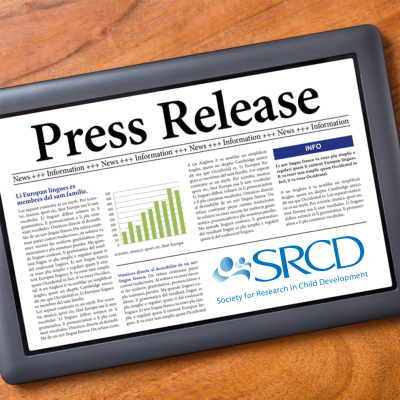Study: Children are interested in politics but need better education from parents and schools
PRESS RELEASE / MONOGRAPHS OF THE SOCIETY FOR RESEARCH IN CHILD DEVELOPMENT: Embargoed for Release on September 10, 2019
Multisite study surveyed children’s experiences and knowledge related to the 2016 U.S. presidential election
The 2020 election is approaching—how should we talk with children about this election and about politics more broadly? The findings of a new multisite study of children’s reactions to the 2016 U.S. presidential election might inform these conversations.
In the study, a team of researchers sought to learn more about the political development of the nation’s children. Given that Hillary Clinton’s 2016 candidacy was the first female major party nomination for the presidency, the researchers also examined children’s knowledge of gender and politics.
The study was conducted by researchers at the University of Kansas, University of Texas at Austin, Whitman College, University of Texas at Tyler, and University of Kentucky. It appears in the Monographs of the Society for Research in Child Development. Accompanying commentaries, videos and teaching materials are available on the Monograph Matters website.
Overall, the study found that children demonstrated interest in and knowledge about the election and candidates, but many had gaps in their knowledge. The researchers argue that children need more input and guidance from adults as they learn about politics and government.
“Our research argues for the establishment of a developmental science of politics that describes and predicts the formation and change of individuals’ political knowledge, attitudes, and behavior beginning in childhood and continuing across the life course,” said Dr. Meagan Patterson, Associate Professor at the University of Kansas’ School of Education.
Researchers interviewed 187 elementary school children (ages 5 to 11 years) before and after the 2016 U.S. presidential election to gain insight about their political knowledge, opinions, and experiences. The sample was drawn from four different states across the U.S. (Kansas, Kentucky, Texas, and Washington) that varied in their voting patterns, and was racially diverse (including predominantly African American, Latinx, and White children).
Highlights show:
- Children follow presidential elections: Over 90% of children sampled could provide information about at least one of the candidates (such as a policy proposal or personal characteristic). Nearly all children (99%) expressed a preference for one candidate to win the election and knew the election outcome.
- Many children expressed negative views of the candidates: Most children sampled (80%) made at least one reference to a candidate’s personal characteristics (such as being smart, nice, mean, or rude). Children were equally likely to mention positive and negative characteristics overall (40% vs 44%), but more children mentioned positive characteristics for Clinton than for Trump. That the majority of children in the sample were drawn from areas in which most voters supported Clinton may explain these findings.
- Environments influence children's political development: Both family and community environments appeared to influence children’s attitudes. For example, children who participated in the study were more likely to support Trump when they reported that their parents supported Trump. Children’s support for candidates also reflected the voting patterns in the children’s counties of residence.
- Children are largely ignorant of gender/sex issues in politics: Children generally lacked knowledge about women’s underrepresentation in government (for example, nearly half of the children sampled reported that 50% or more of all U.S. governors and members of Congress are women whereas the accurate percentages at that time were around 20%). Only 65% of children knew that no woman has ever been president of the United States, a smaller percentage than has been found in past studies.
“Although our study focused on the 2016 United States presidential election in particular, the data emphasize the need for high quality civics education throughout childhood more generally,” said Dr. Rebecca Bigler, Professor Emeritx at the University of Texas at Austin. “Additionally, children should be given opportunities to take knowledge and views outside the walls of their own classroom and apply them to larger communities (their schools, neighborhoods, cities). Such activities will continue to foster their interest and political efficacy.”
The study was supported by University of Kansas School of Education Research Support Fund and the University of Kansas Emerging Scholars program.
###
Summarized from the Monographs of the Society for Research in Child Development, Toward a Developmental Science of Politics by Patterson, M (University of Kansas), Bigler, R (University of Texas at Austin), Pahlke, E (Whitman College), Brown, C (University of Kentucky), Hayes, A (University of Texas at Tyler), Ramirez, M (University of Texas at Austin), Nelson, A (University of Kentucky). Copyright 2019 The Society for Research in Child Development, Inc. All rights reserved.
Contact Information:
Jessica Efstathiou
Society for Research in Child Development
202-800-3255
jefstathiou@srcd.org


